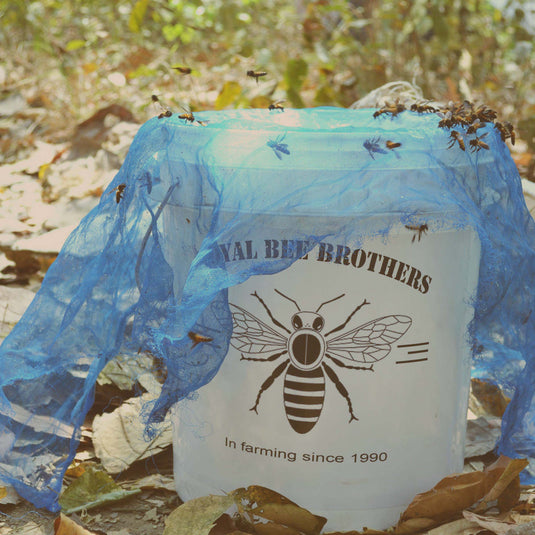There are several reasons why someone may choose forest honey over box honey. Forest honey is harvested from beehives located in natural forest environments, while box honey is harvested from beehives that are placed in man-made boxes. Here are some reasons why forest honey may be a better choice:
- Higher nutritional content
Forest honey is typically higher in nutritional content compared to box honey. This is because the bees that produce forest honey gather nectar from a wide variety of plant species found in forest areas, resulting in a honey that is rich in antioxidants, minerals, and other beneficial nutrients. Box honey, on the other hand, is often produced from nectar gathered from a smaller range of plant species, resulting in a honey that may be lower in nutritional value.
- Free from pesticides and pollutants
Bees that produce forest honey gather nectar from plants and trees that are growing in natural environments, which are less likely to be exposed to pesticides and pollutants compared to plants that are grown in agricultural settings. Box honey, on the other hand, may contain traces of pesticides and pollutants from the surrounding environment.
- Unique flavor and aroma
The flavor and aroma of forest honey is often more complex and nuanced compared to box honey. This is because the bees that produce forest honey gather nectar from a wide variety of plant species, resulting in a honey that has a unique flavor and aroma profile. Box honey, on the other hand, may have a more uniform flavor and aroma profile, as it is often produced from nectar gathered from a smaller range of plant species.
- Support for sustainable beekeeping practices
Harvesting honey from beehives in natural forest environments can be a sustainable way to support beekeeping practices. Forest honey can be harvested without disrupting the natural balance of the environment, and can provide a source of income for local communities. In contrast, box honey is often produced using commercial beekeeping practices, which can involve the use of chemicals and pesticides that can harm bees and the environment.
- Potential health benefits
As mentioned earlier, forest honey may offer a range of potential health benefits, including anti-inflammatory, antioxidant, immune-boosting, wound-healing, digestive health, and energy-boosting properties. While box honey may also offer some of these benefits, forest honey may be more potent due to its higher nutritional content and unique plant profiles.
Overall, choosing forest honey over box honey can provide a range of benefits, including higher nutritional content, free from pesticides and pollutants, unique flavor and aroma, support for sustainable beekeeping practices, and potential health benefits.
Bees collect nectar from a variety of plant species found in forest areas, resulting in a honey that is unique in color, taste, and nutritional profile. The plant species that bees collect nectar from can vary greatly depending on the location, climate, and season, which can result in different types of forest honey.
Benefits of forest honey
- Rich in antioxidants
Forest honey contains a range of antioxidants, which are compounds that help to protect the body from damage caused by free radicals. Free radicals are unstable molecules that can cause oxidative stress, which has been linked to a range of chronic diseases, including cancer, heart disease, and Alzheimer's disease. The antioxidants in honey, including flavonoids and phenolic acids, can help to neutralize free radicals and reduce oxidative stress in the body.
- Anti-inflammatory properties
Inflammation is a natural response to injury or infection, but chronic inflammation can contribute to the development of a range of diseases, including arthritis, diabetes, and heart disease. Honey has been shown to have anti-inflammatory properties, which may help to reduce inflammation in the body and prevent chronic diseases. The anti-inflammatory properties of honey are thought to be due to its high concentration of antioxidants and other bioactive compounds.
- Immune-boosting properties
Honey has been used for centuries as a natural remedy for coughs, colds, and other respiratory infections. Research has shown that honey has antibacterial, antiviral, and antifungal properties, which may help to boost the immune system and protect against infections. Honey also contains prebiotics, which are compounds that promote the growth of beneficial bacteria in the gut, which can also help to boost the immune system.
- Wound-healing properties
Honey has long been used as a natural remedy for wounds and burns, and research has shown that it can be an effective treatment for a range of skin conditions, including burns, cuts, and ulcers. The antibacterial properties of honey help to prevent infection, while its anti-inflammatory properties can reduce swelling and pain. Honey also contains enzymes that can help to promote tissue growth and repair.
- Digestive health benefits
Honey has been shown to have a range of benefits for digestive health. The prebiotics in honey can help to promote the growth of beneficial bacteria in the gut, which can improve digestion and reduce the risk of digestive disorders such as irritable bowel syndrome (IBS). Honey has also been shown to have antibacterial properties that can help to protect against infections that can cause digestive problems.
- Energy-boosting properties
Honey is a natural source of carbohydrates, which can provide a quick burst of energy. The glucose in honey is rapidly absorbed by the body and can help to fuel physical activity and improve athletic performance. Honey also contains other nutrients such as vitamins and minerals, which can provide additional energy and support overall health.


